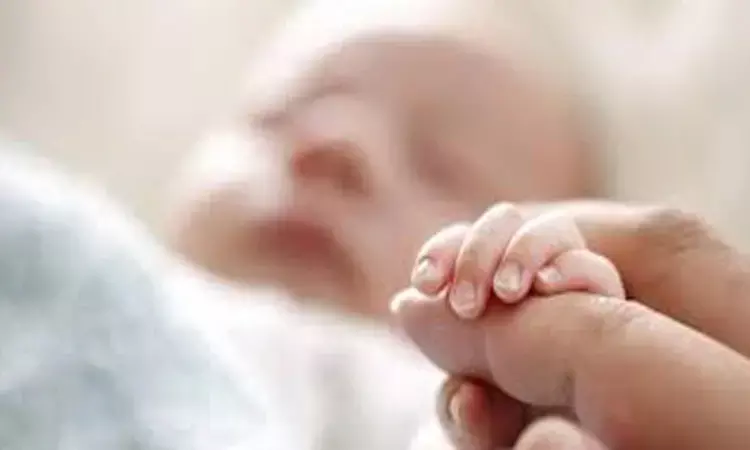- Home
- Medical news & Guidelines
- Anesthesiology
- Cardiology and CTVS
- Critical Care
- Dentistry
- Dermatology
- Diabetes and Endocrinology
- ENT
- Gastroenterology
- Medicine
- Nephrology
- Neurology
- Obstretics-Gynaecology
- Oncology
- Ophthalmology
- Orthopaedics
- Pediatrics-Neonatology
- Psychiatry
- Pulmonology
- Radiology
- Surgery
- Urology
- Laboratory Medicine
- Diet
- Nursing
- Paramedical
- Physiotherapy
- Health news
- Fact Check
- Bone Health Fact Check
- Brain Health Fact Check
- Cancer Related Fact Check
- Child Care Fact Check
- Dental and oral health fact check
- Diabetes and metabolic health fact check
- Diet and Nutrition Fact Check
- Eye and ENT Care Fact Check
- Fitness fact check
- Gut health fact check
- Heart health fact check
- Kidney health fact check
- Medical education fact check
- Men's health fact check
- Respiratory fact check
- Skin and hair care fact check
- Vaccine and Immunization fact check
- Women's health fact check
- AYUSH
- State News
- Andaman and Nicobar Islands
- Andhra Pradesh
- Arunachal Pradesh
- Assam
- Bihar
- Chandigarh
- Chattisgarh
- Dadra and Nagar Haveli
- Daman and Diu
- Delhi
- Goa
- Gujarat
- Haryana
- Himachal Pradesh
- Jammu & Kashmir
- Jharkhand
- Karnataka
- Kerala
- Ladakh
- Lakshadweep
- Madhya Pradesh
- Maharashtra
- Manipur
- Meghalaya
- Mizoram
- Nagaland
- Odisha
- Puducherry
- Punjab
- Rajasthan
- Sikkim
- Tamil Nadu
- Telangana
- Tripura
- Uttar Pradesh
- Uttrakhand
- West Bengal
- Medical Education
- Industry
Severe dyspnea and uncontrolled seizures following meperfluthrin poisoning - A case report

Shengkun Zheng and colleagues from the Department of Emergency, Xiamen Children's Hospital, China recently reported an interesting case of meperfluthrin poisoning by ingestion of a meperfluthrin-based liquid mosquito repellent in a 16-month-old infant.
The study is published in the BMC Pediatrics.
Meperfluthrin is a novel sanitary cyhalothrin insecticide invented in China and has increasingly been used to produce liquid mosquito repellents. However, recent researches have revealed that inhalation of smoke from burning mosquito incense stick or coil containing meperfluthrin leads to liver damage, renal impairment and lung injury in rats. Animal experiments have showed oral lethal dose 50% (LD50) of meperfluthrin is greater than 500 mg/kg, thus oral meperfluthrin mainly causes mild toxic symptoms which can recover well in a short term. Till date, oral meperfluthrin poisoning in human has rarely been reported in the literature.
Hence, the authors studied a 16-month-old boy with a history of accident ingestion of meperfluthrin who was admitted to the hospital's emergency department. The child exhibited severe dyspnea, and the lung radiograph showed multiple patchy and cord-like high-density shadows bilaterally in a short time.
He also suffered 35 min of seizures which were finally controlled by the intravenous infusion of propofol. He was diagnosed with meperfluthrin poisoning, status epilepticus and severe pneumonia.
The treatment with methylprednisolone, aerosolized beclomethasone dipropionate, anti-infection, and some critical supportive therapy was initiated. After a 12 month follow up, the patient was found to be in good health and showed no symptoms.
Therefore, the authors concluded that "meperfluthrin poisoning is rare. Acute oral meperfluthrin poisoning can show neurotoxic effects and pulmonary toxicity, and neurotoxic manifestations can be presented as tonic-clonic seizures that the general use of 10% chloral hydrate, midazolam or phenobarbital fail to control."
Controlling seizures rapidly and ensuring an adequate oxygen supply are critical to the successful treatment. The underlying mechanisms of meperfluthrin poisoning require further study, they further added.
Dr. Nandita Mohan is a practicing pediatric dentist with more than 5 years of clinical work experience. Along with this, she is equally interested in keeping herself up to date about the latest developments in the field of medicine and dentistry which is the driving force for her to be in association with Medical Dialogues. She also has her name attached with many publications; both national and international. She has pursued her BDS from Rajiv Gandhi University of Health Sciences, Bangalore and later went to enter her dream specialty (MDS) in the Department of Pedodontics and Preventive Dentistry from Pt. B.D. Sharma University of Health Sciences. Through all the years of experience, her core interest in learning something new has never stopped. She can be contacted at editorial@medicaldialogues.in. Contact no. 011-43720751
Dr Kamal Kant Kohli-MBBS, DTCD- a chest specialist with more than 30 years of practice and a flair for writing clinical articles, Dr Kamal Kant Kohli joined Medical Dialogues as a Chief Editor of Medical News. Besides writing articles, as an editor, he proofreads and verifies all the medical content published on Medical Dialogues including those coming from journals, studies,medical conferences,guidelines etc. Email: drkohli@medicaldialogues.in. Contact no. 011-43720751


